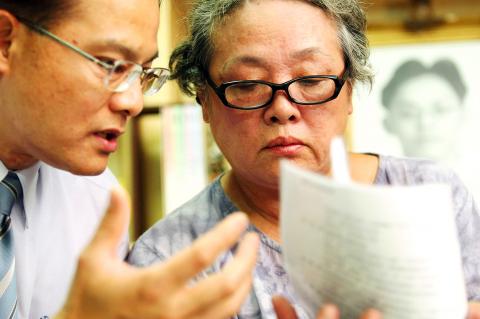A military court yesterday acquitted Chiang Kuo-ching (江國慶), who was executed for the rape and murder of a girl 15 years ago, in a posthumous trial.
Chiang was executed in 1997 after being convicted of sexually abusing and murdering a five-year-old girl.
The Military Northern District Court yesterday morning handed down the ruling after the Military Supreme Court Prosecutors’ Office filed an extraordinary appeal with the Military Supreme Court in May last year to reopen the case.

Photo: Liao Chen-huei, Taipei Times
The Military Supreme Prosecutors’ Office’s legal action followed findings by the Control Yuan that Chiang had been tortured by military investigators.
The Ministry of National Defense yesterday said it was the final verdict and it would help Chiang’s family apply for national compensation.
The ministry said the court ruled that Chiang’s statements were made against his will and that the blood-soaked toilet paper and knife used as evidence against Chiang were re-examined by forensic experts, who concluded that they could not prove Chiang’s involvement in the murder.
Shen Shih-wei (沈世偉), an official with the ministry’s Judicial Department, visited Chiang’s mother Wang Tsai-lien (王彩蓮) at her apartment yesterday afternoon and delivered a copy of the ruling.
Wang’s attorney Greg Yo (尤伯祥) and two other attorneys were in the court to hear the ruling.
Yo said Chiang’s family is expected to receive about NT$100 million (US$3.3 million) in compensation.
Yo, who also represented the Judicial Reform Foundation, called on Taipei district prosecutors to quickly complete an investigation into the role and responsibility of former minister of national defense Chen Chao-min (陳肇敏) and other military officers in the wrongful execution.
Yo said Chen was the mastermind behind the botched investigation of Chiang’s case.
In an interview in the morning, Wang said: “I will bring the acquittal ruling to my son and my husband’s shrines.”
She added she would not forgive those military officials responsible and wanted to see the verdicts against former air force counterintelligence official Ko Chung-ching (柯仲慶) and others.
The Supreme Prosecutors’ Office Special Investigation Division concluded on May 24 that Chiang, who was serving in the air force command in 1996 at the time of the murder, was not guilty of the crime.
Chiang was executed at the age of 21.
The Supreme Prosecutors’ Office has since charged a new suspect, Hsu Jung-chou (許榮洲), with the girl’s murder.
Prosecutors said Chiang was tortured during questioning, including exposure to strong lights and being forced to watch a video of the girl’s autopsy. He was also threatened with an electric prod and deprived of sleep while being forced to undergo strenuous physical activities.
Prosecutors said Hsu left bloody palm prints at the scene of the crime, which a DNA test confirmed were his.
Hsu’s case is pending in the Taipei District Court.

A preclearance service to facilitate entry for people traveling to select airports in Japan would be available from Thursday next week to Feb. 25 at Taiwan Taoyuan International Airport, Taoyuan International Airport Corp (TIAC) said on Tuesday. The service was first made available to Taiwanese travelers throughout the winter vacation of 2024 and during the Lunar New Year holiday. In addition to flights to the Japanese cities of Hakodate, Asahikawa, Akita, Sendai, Niigata, Okayama, Takamatsu, Kumamoto and Kagoshima, the service would be available to travelers to Kobe and Oita. The service can be accessed by passengers of 15 flight routes operated by

Alain Robert, known as the "French Spider-Man," praised Alex Honnold as exceptionally well-prepared after the US climber completed a free solo ascent of Taipei 101 yesterday. Robert said Honnold's ascent of the 508m-tall skyscraper in just more than one-and-a-half hours without using safety ropes or equipment was a remarkable achievement. "This is my life," he said in an interview conducted in French, adding that he liked the feeling of being "on the edge of danger." The 63-year-old Frenchman climbed Taipei 101 using ropes in December 2004, taking about four hours to reach the top. On a one-to-10 scale of difficulty, Robert said Taipei 101

MORE FALL: An investigation into one of Xi’s key cronies, part of a broader ‘anti-corruption’ drive, indicates that he might have a deep distrust in the military, an expert said China’s latest military purge underscores systemic risks in its shift from collective leadership to sole rule under Chinese President Xi Jinping (習近平), and could disrupt its chain of command and military capabilities, a national security official said yesterday. If decisionmaking within the Chinese Communist Party has become “irrational” under one-man rule, the Taiwan Strait and the regional situation must be approached with extreme caution, given unforeseen risks, they added. The anonymous official made the remarks as China’s Central Military Commission Vice Chairman Zhang Youxia (張又俠) and Joint Staff Department Chief of Staff Liu Zhenli (劉振立) were reportedly being investigated for suspected “serious

Taiwanese and US defense groups are collaborating to introduce deployable, semi-autonomous manufacturing systems for drones and components in a boost to the nation’s supply chain resilience. Taiwan’s G-Tech Optroelectronics Corp subsidiary GTOC and the US’ Aerkomm Inc on Friday announced an agreement with fellow US-based Firestorm Lab to adopt the latter’s xCell, a technology featuring 3D printers fitted in 6.1m container units. The systems enable aerial platforms and parts to be produced in high volumes from dispersed nodes capable of rapid redeployment, to minimize the risk of enemy strikes and to meet field requirements, they said. Firestorm chief technology officer Ian Muceus said